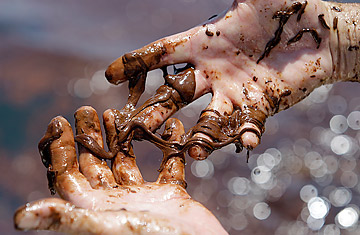
Marine reef ecologist Scott Porter with oil on his hands from the Gulf spill
Oil is a lubricant — just what you need to keep a revolving door spinning freely for decades. That, in a single image, sums up the Minerals Management Service (MMS), a pip-squeak unit of the Interior Department created by then Secretary James Watt in 1982 that has found itself at the center of the worst environmental disaster in U.S. history. Charged with regulating and promoting oil drilling off America's coasts, MMS has not always made it easy to distinguish the regulators from the regulated, and no wonder. The agency is the nation's second largest source of revenue (after the IRS), pouring $13 billion annually into the U.S. Treasury from royalties on oil and other sources. When there's so much money sloshing around, sloppiness and coziness can be tolerated, until some of that crude begins washing up in Louisiana marshes.
Prior to the spill, MMS flared into the news only when its misbehavior — sex and drugs shared by MMS staffers and energy-company officials — lit up a 2008 report by Interior inspector general Earl Devaney, who blasted the agency's "culture of substance abuse and promiscuity" along with its "culture of ethical failure." But sex, drugs and other assorted bribes are mere symptoms of a deeper rot built on collusion between those doing the drilling and those charged with monitoring it.
Corner-cutting has been common practice at MMS for years: in the days leading up to the explosion of the Deepwater Horizon rig on April 20, which caused the ongoing spill, MMS officials scaled back tests on the well's blowout preventer and delayed when those tests would be run at all. Under MMS rules, backups for blowout preventers have been encouraged but not required ("Regulation by suggestion," as Democratic Senator Sheldon Whitehouse of Rhode Island put it). Efforts to stiffen such casual rulemaking have always foundered because the work of MMS has been arcane, profitable and largely overseen by pro-petroleum lawmakers unwilling to rock the rig.
And that worked for a while — but only until the risks and complexity of drilling operations got too far ahead of the loose regs that the government did put in place. Twenty-five years ago, only 6% of the oil tapped from the Gulf — about 21 million bbl. per year — came from wells drilled more than 1,000 ft. underwater, where the immense pressure makes everything more difficult. Last year, those wells provided 456 million bbl. — 80% of the Gulf's total, and a quarter of U.S. oil production. The Deepwater Horizon rig was drilling 5,000 ft. down — close to a mile below the wave tops. The further rigs strayed from shore, the looser regulations got — at least relative to the risks — with proliferating exemptions and loopholes allowing operations that otherwise would not be permitted. "The pace of technology has definitely outrun the regulations," Coast Guard rig inspector Lieut. Commander Michael Odom told a panel investigating the Gulf disaster last month.
Interior Secretary Ken Salazar, the Cabinet officer ultimately responsible for MMS, defends the agency. There are "pockets" of problems, he says, but most of its 1,700 employees do good work. There's some truth in that: MMS had overseen the drilling of 36,000 wells in the Gulf of Mexico before the Deepwater Horizon began hemorrhaging crude. But when an accident like the current one has the power to shut down hundreds of miles of coastline and imperil state economies, your safety record really needs to be 36,001.
